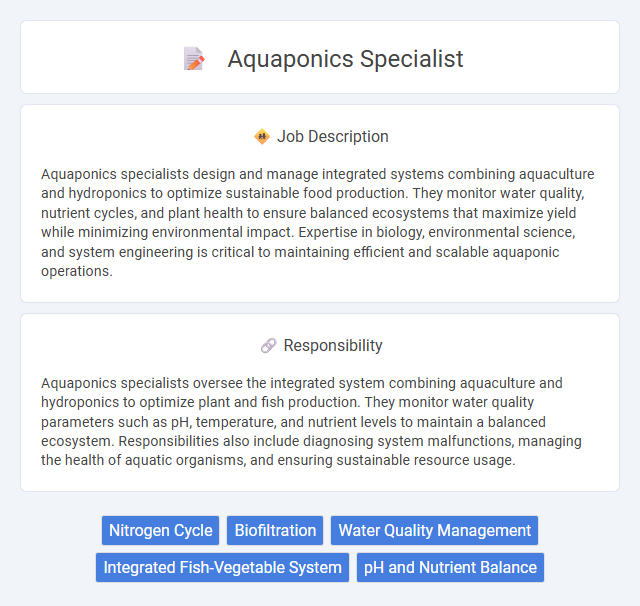
Aquaponics specialists design and manage integrated systems combining aquaculture and hydroponics to optimize sustainable food production. They monitor water quality, nutrient cycles, and plant health to ensure balanced ecosystems that maximize yield while minimizing environmental impact. Expertise in biology, environmental science, and system engineering is critical to maintaining efficient and scalable aquaponic operations.
People with a strong interest in sustainable agriculture and biology are likely to find the aquaponics specialist role suitable, as it requires understanding both plant cultivation and aquatic systems. Candidates who are comfortable working in controlled environments and handling technical equipment may have a higher probability of success. However, individuals who prefer purely outdoor farming or lack patience for constant system monitoring might find this job less fitting.
Qualification
Aquaponics specialists require a strong foundation in biology, hydroponics, and aquaculture, typically supported by a bachelor's degree in environmental science, agricultural engineering, or a related field. Expertise in water chemistry, nutrient cycling, and fish health management is essential for optimizing system efficiency and crop yield. Hands-on experience with sustainable farming practices, system troubleshooting, and automated control technologies significantly enhances employability in this sector.
Responsibility
Aquaponics specialists oversee the integrated system combining aquaculture and hydroponics to optimize plant and fish production. They monitor water quality parameters such as pH, temperature, and nutrient levels to maintain a balanced ecosystem. Responsibilities also include diagnosing system malfunctions, managing the health of aquatic organisms, and ensuring sustainable resource usage.
Benefit
Aquaponics specialists likely enhance sustainable agriculture by combining aquaculture and hydroponics, which potentially reduces water usage and chemical fertilizers. Their expertise probably supports increased food production efficiency with a lower environmental footprint. Employing an aquaponics specialist may improve system design and maintenance, leading to higher crop yields and healthier aquatic life.
Challenge
An Aquaponics specialist is likely to face challenges related to maintaining the delicate balance between aquatic animals and plant systems, which requires precise monitoring of water quality and nutrient levels. The probability of encountering disease outbreaks or system malfunctions increases due to the complex symbiotic relationships involved. Effective problem-solving skills and adaptability are probably essential to address these ongoing environmental and technical challenges.
Career Advancement
Aquaponics specialists harness expertise in integrated fish and plant farming systems to optimize sustainable food production, driving innovation in eco-friendly agriculture. Proficiency in water quality management, system design, and biological cycles enables career growth from technical roles to leadership positions in research, operations, or environmental consulting. Continuous learning in cutting-edge aquaculture technologies and certifications enhances opportunities for advancement within agricultural technology firms or environmental organizations.
Key Terms
Nitrogen Cycle
An Aquaponics specialist expertly manages the nitrogen cycle to maintain a balanced ecosystem between fish, plants, and beneficial bacteria. They monitor ammonia, nitrite, and nitrate levels, ensuring efficient conversion by nitrifying bacteria to optimize plant nutrient uptake and protect fish health. Mastery of this biochemical process is critical for sustaining high-yield, eco-friendly aquaponic systems.
Biofiltration
An aquaponics specialist with expertise in biofiltration manages the symbiotic relationship between aquatic animals and plants by optimizing biofilter systems that convert ammonia into nitrates, crucial for plant nutrition and water quality. Mastery in biofiltration involves selecting and maintaining media with high surface area to support beneficial nitrifying bacteria, ensuring efficient ammonia and nitrite conversion. Proficient knowledge of parameters such as pH, temperature, and dissolved oxygen levels is essential for sustaining biofilter performance and promoting a healthy aquaponic ecosystem.
Water Quality Management
Aquaponics specialists expertly monitor and optimize water quality parameters such as pH, ammonia, nitrite, nitrate, and dissolved oxygen to ensure a balanced ecosystem for both fish and plants. They implement advanced filtration and aeration systems to maintain ideal conditions, preventing toxic buildup and promoting healthy growth cycles. Expertise in nutrient cycling and microbial management is essential for sustaining water clarity and supporting aquaponic productivity.
Integrated Fish-Vegetable System
An Aquaponics specialist focuses on designing, managing, and optimizing integrated fish-vegetable systems that combine aquaculture and hydroponics to sustainably produce food. Expertise includes maintaining water quality, balancing nutrient cycles, and ensuring symbiotic health between fish species like tilapia or catfish and crops such as lettuce or herbs. Mastery in system automation and biofiltration enhances productivity and resource efficiency in commercial or research aquaponics operations.
pH and Nutrient Balance
An aquaponics specialist expertly manages water pH levels, maintaining an optimal range between 6.8 and 7.2 to ensure nutrient availability and healthy plant and fish growth. Precise nutrient balancing involves monitoring concentrations of nitrogen, phosphorus, and potassium, which are vital for sustaining the symbiotic ecosystem in aquaponic systems. Continuous adjustment based on real-time water quality data maximizes productivity and prevents imbalances that can harm aquatic life and crops.
 kuljobs.com
kuljobs.com